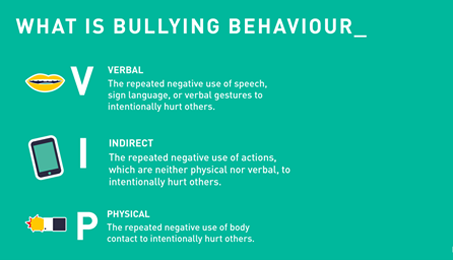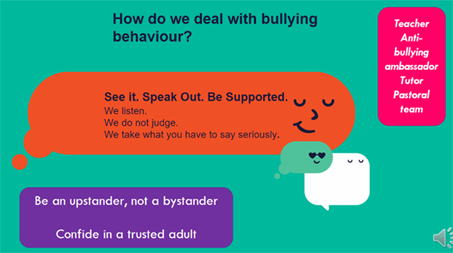 I’m Mrs Dodson and I am the school’s anti-bullying lead. I work closely with the DSL, Mrs Ourabi and the other two Heads of School, Mrs Owen-Moore and Mr Carnwell to keep bullying in check. It is our belief that bullying of any kind is unacceptable. School should be a happy, safe, inclusive environment, where all students thrive and fulfil their potential. We are proud of our school and our students and want the best for them. As a team we work hard to make the school a welcoming place where bullying is a rare occurrence and that students feel confident to seek support should they need to.
I’m Mrs Dodson and I am the school’s anti-bullying lead. I work closely with the DSL, Mrs Ourabi and the other two Heads of School, Mrs Owen-Moore and Mr Carnwell to keep bullying in check. It is our belief that bullying of any kind is unacceptable. School should be a happy, safe, inclusive environment, where all students thrive and fulfil their potential. We are proud of our school and our students and want the best for them. As a team we work hard to make the school a welcoming place where bullying is a rare occurrence and that students feel confident to seek support should they need to.
What is bullying?

There is no legal definition of bullying. However, it is often defined as “repeated negative behaviour that is intended to make others feel upset, uncomfortable or unsafe” (Diana award) and the reasons for bullying are often related to differences between people, such as gender, race, sexual orientation or gender orientation. However, this list is not exhaustive and often the real reason is for bullying is related to how the bully feels about themself. Bullying can take many forms. These are listed below:
-
name calling
-
taunting
-
mocking
-
making offensive comments
-
physical assault
-
taking or damaging belongings
-
cyber bullying (which can include messages on social media and online gaming platforms)
-
producing offensive graffiti
-
gossiping and spreading hurtful and untruthful rumours
-
excluding people from groups
-
sexual harassment
-
sexual abuse
Any incidents of bullying in school that are reported or witnessed will be noted and taken seriously. Even if behaviour is considered to be ‘banter’ or ‘a bit of a laugh’, it can be quite intimidating for a person who the comments are targeted at. Students should report anything that they feel uncomfortable with to a member of staff, the pastoral team or equally to one of their peers, who may speak up on their behalf. Likewise, students who witness bullying or intimidating behaviour are always encouraged to pass this on and to be an ‘upstander’. The only way we can combat bullying is to stand together.
Anti-bullying ambassadors

In order to promote an inclusive, harmonious environment, the staff work collaboratively with students. Students take part in activities during PDC, assemblies and anti-bullying week to with the purpose of raising awareness of bullying and to highlight ways of prevention. In doing this we hope to create a ‘culture of kindness’ across the school. To further promote this we employ a group of students as ‘Anti-Bullying Ambassadors’, who take the lead on this very important issue. They are a group of students from Year 11 and 12 who are passionate about standing up against bullying behaviour and believe they can make a positive change to our school. Their main purpose is to provide a support network for all students in school and raise awareness of the different types of bullying. Alongside our many anti-bullying campaigns across the year, anti-bullying ambassadors host a weekly drop-in room to offer friendship and support. We are very proud of our ambassadors, who do a great job in helping to stamp out bullying.
Here are some of their opinions of their role:
"I am an anti-bullying ambassador as I believe it is we, the younger generation that needs to act upon bad behaviour. Generations have fought against bullying and now it is our time to make a difference."
“I think this campaign is so important because it shows resilience towards bullying and the problems people face daily when it comes to verbal or physical abuse. I am determined to create a safer and happier environment here in Ecclesbourne School where we can learn stress free! There is never a better time to take a stand up to bullying…”
“This campaign is here to educate students on the problems of bullying that can be verbal bullying, physical bullying or cyber bullying. I believe The Ecclesbourne School should be a safe place for all students. If you see something say something.”
Anti-bullying charter

Our message to those who bully is very clear – it is not acceptable. The anti-bullying ambassadors have drawn up a charter which they feel expresses the school’s stance on bullying and reminds students of how we would want our students to behave:
-
Treat each other as you would wish to be treated
-
Use social networks appropriately to spread positivity
-
Use appropriate language, be inclusive
-
Do not tolerate discrimination of any kind
-
Stand up against bullying – report it to a trusted adult
-
Don’t suffer in silence – speak to the ambassadors
This is reinforced by clear sanctions for any student who has been involved in bullying behaviour. These can range from a formal verbal warning, all the way up to a fixed term exclusion, and will depend upon the frequency and severity of the bullying behaviour.